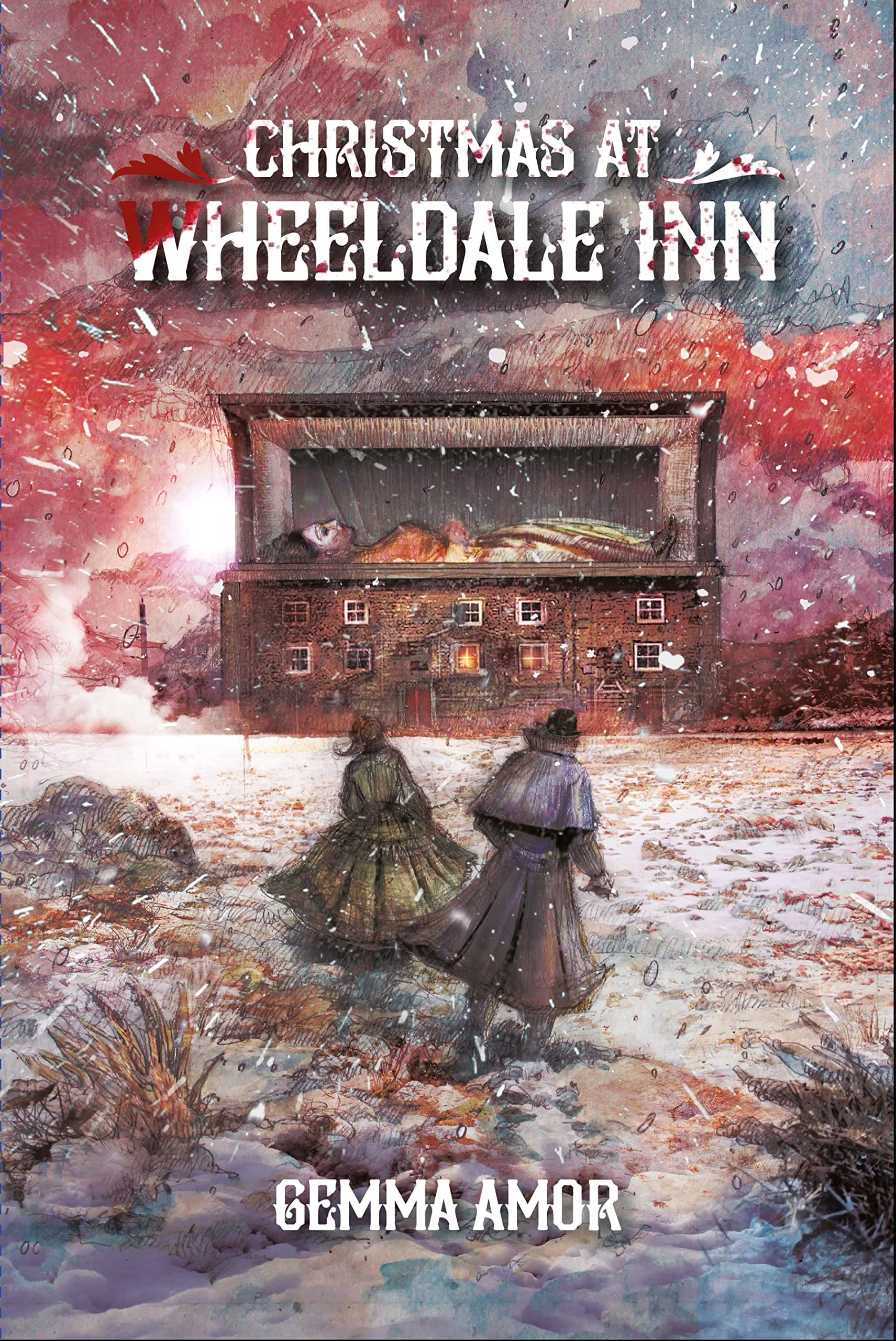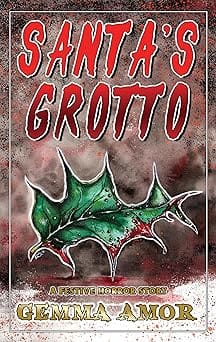
Synopsis:
Christmas Eve. A horse-drawn coach battles its way through a terrible snow storm, travelling the old Roman road that cuts across Wheeldale Moor. The carriage bears the miserable burden of Mr. and Mrs. Wilcox, a formerly well-to-do couple now fleeing London and the threat of debtor’s jail, for Mr. Wilcox has been imprudent with the family fortune.
Not that Mrs. Wilcox cares much for money. She is still grieving a great loss, a loss that cannot be replaced with any number of riches.
As the weather worsens, the carriage is overturned, with deadly consequences. Mr. and Mrs. Wilcox find themselves out in a freezing storm, lost, injured and penniless upon the moors. Salvation comes in the form of Wheeldale Inn: the highest public house in Yorkshire. An isolated sanctuary, yet a peculiar one. The Innkeeper seems welcoming enough, but oddities abound: a corpse, a silent son, a surfeit of victuals, and memories that come and go at a whim.
As the intrepid guests settle in, they realise all is definitely not as it seems at Wheeldale. Both husband and wife are forced to confront truths about themselves, their past, their present, and their future in the most terrifying of ways. Will Christmas Day be a happy one for the Wilcox family, or will Wheeldale disrupt their lives so completely there is no coming back?
Review:
Elves on the shelves are wreaking havoc once again. Excessively joyous carollers are braving the cold. Everything is peppermint flavoured. Mariah Carey has defrosted. It’s beginning to look a lot like Christmas folks, and as I’ve been proving to you all December, there is no better way to enjoy the season than with hot chocolate and great horror. Perfect for fans of Naben Ruthnum’s weird historical horror “Helpmeet,” Gemma Amor’s festive horror novella “Christmas at Wheeldale Inn,” is brimming with the misery and decay necessary to offset the relentless, saccharine joy of Christmas. Less sleigh bells, more death knells, less deck the halls and more crumbling drywall… that’s all I got. Whilst not completely devoid of that holly-jolly spirit, Amor’s yuletide is one that is covered in mould and mildew, wrapped in damp, decomposing wrapping paper- this book is rotten, and just the kind of quick read I was looking for.
We follow The Wilcoxes, fleeing their London home and debtor’s jail. As is typical in England, the weather is certainly not on their side, and they, whilst traversing an old Roman Road, find their carriage overturned, the horses incapacitated, and their driver as dead as a doornail. Whilst Mrs. Wilcox feels terrible leaving the coachman (a father) unconscious in the snow, her husband Thomas, perhaps amongst the most vile and callous, self-preservationist characters I’ve come across of late, is eager to get back on the road, well aware that both of them (but especially him) will freeze to death if they don’t. He wastes little time in dragging his limping wife onward, determined to keep his own hide from frostbite, marital harmony be damned.Thank goodness they stumble across the Wheeldale Inn. They are fed, watered and sheltered, but despite the stern, yet benevolent demeanour of the innkeeper, the roaring fire that’s crackling in the hearth, and the delicious banquet that’s served, something is very very off. Perhaps it’s the silent presence of the innkeeper’s son? Maybe it’s the mounting tension between the Wilcoxes? I’ll level with you though, it’s probably the dead body in the parlour.
Let’s start with Thomas. I have read about mass murderers, psycho-killers, literal demons, who have upset and irked me less than this man. He is the human equivalent of a lump of coal in a Christmas stocking, although at least a lump of coal is somewhat useful. Yes, possibly the most unlikable, self-important, odious and sad excuse for a person I’ve read about since C.V Hunt’s “Ritualistic Human Sacrifice,” the best point of comparison I can give you is Roald Dahl’s “Mr Twit.” He’s not quite a devil incarnate, but he is repulsive, selfish and belligerent in the same way Priestley’s “Mr Birling,” or Dickens’ “Thomas Gradgrind,”are. A character that is perversely fun to hate, his unfortunate existence admittedly allows for a brilliant commentary on karma and redemption. In sharp contrast, Mrs. Wilcox is a breath of cold, fresh air. Long-suffering and far easier to stomach, she anchors the narrative with her darkly humorous inner monologue, a running good-for-her style commentary that relentlessly skewers her boorish husband whilst also allowing for a meditation on the sanctity (or lack of) of marriage. Her quiet reflections crackle with the potential for liberation, making her a character you can truly root for.
Jagged, dark and stiff with rigamortis, “Christmas at Wheeldale Inn,” is a novella that peels away the gaudy wrapping paper of holiday cheer, revealing the dark, writhing truths beneath. Nasty and miserable, until it’s suddenly not, what this novella is lacking in goodwill, it makes up for in its gorgeous prose and compulsive readability.
It’s also absolutely worth highlighting that Shortwave Publishing have just announced that Gemma will be writing the 10th instalment in their epic “Killer VHS series,” “Happy Hour.” I was pumped anyway, but now excited is quite the understatement.
Bonus Review: Santa’s Grotto by Gemma Amor

Synopsis:
So here we are, at a strange, sprawling place called Mistletoe farm, nestled in the lows of rural Hampshire.
Six adults, three small children, and one baby.
It is one week prior to Christmas. The children scramble enthusiastically through thick furrows of mud, headed towards a large white canvas marquee that sits at the top of a wide, empty field boxed in by twisted hedgerow. The adults trail somewhat less enthusiastically behind.
The air is damp, the landscape curiously minimal in terms of colour. It’s just brown and grey, brown and grey, as far as the eye can see.
England is like that, a lot of the time. Different shades of mud and sky that lean on each other.The marquee is ugly, discoloured, and offers little relief on the eye.
But we’re going anyway, because this, we have been told, is where we’ll find Santa’s Grotto.
And who doesn’t want to meet Santa at Christmas time?
Review:
Far from merry and bright, Gemma Amor’s “Santa’s Grotto,” reads like a festive, extreme, and further deranged, “Charlie and The Chocolate Factory.” Through the lens of a delightfully snarky and truly British narrative protagonist, who shares my own resigned misery in relation to being dragged around Santa’s grottos and Christmas lights, Amor delivers a commentary on responsibility and redemption. Needless to say that no punches are pulled when it comes to body horror. This little novella has evil elves, an animatronic donkey from the depths of hell, and is the perfect excuse for you to take yourself off away from the in-laws for an hour and a half this Christmas.
We follow Georgie, who, alongside her sad excuse for a husband, his two siblings, and a whole host of boisterous children, is dragged to a Santa’s grotto in Hampshire. Sure, having had a little too much to drink the night before, there are things she’d rather be doing than trekking through a muddy field. The attraction will be mediocre at best. At worst? Well. Things are off to a rocky start when some strange smelling mulled wine is practically forced down the family’s throats… Santa’s rules. When one of the elves at the door proceeds to break and brand her husband’s hand, and the rest of the family begin to become hazy, Georgie is pretty damn sure she’ll be lucky to make it out of this one alive.












Leave a Reply